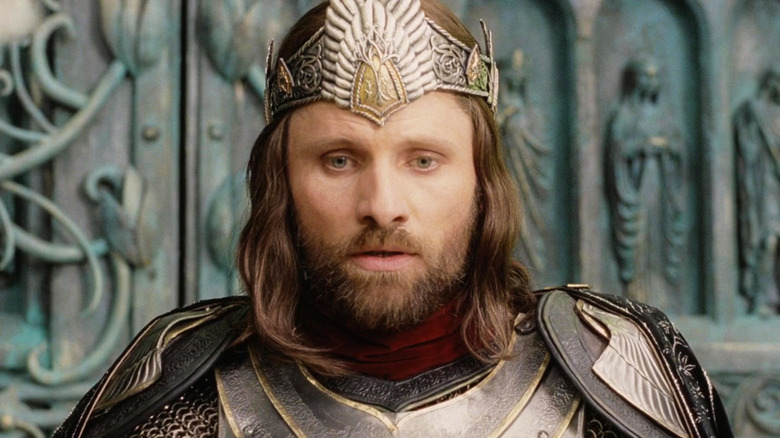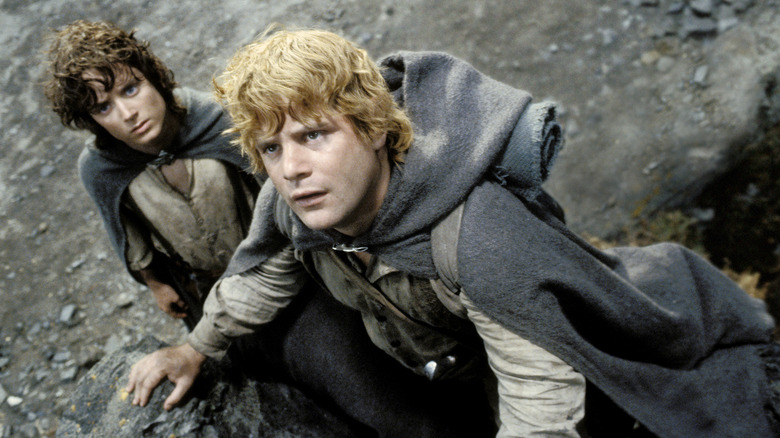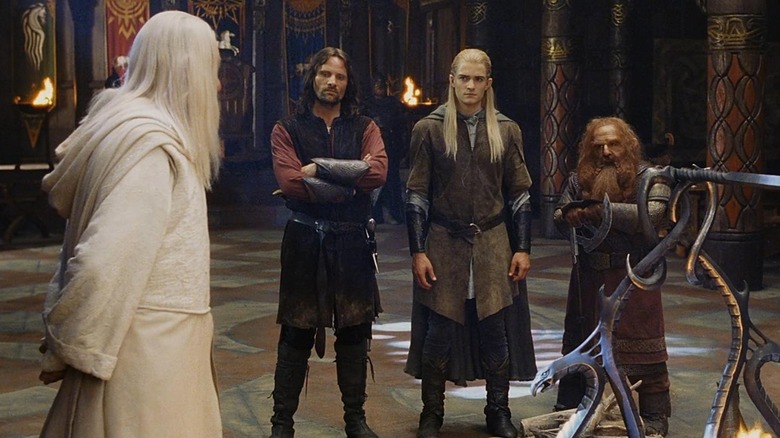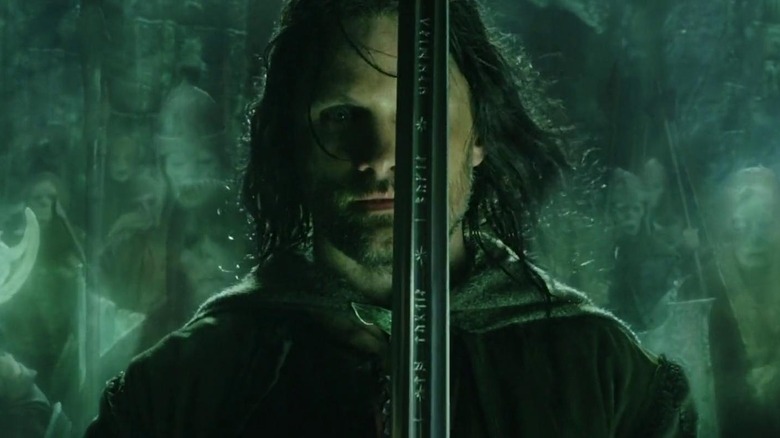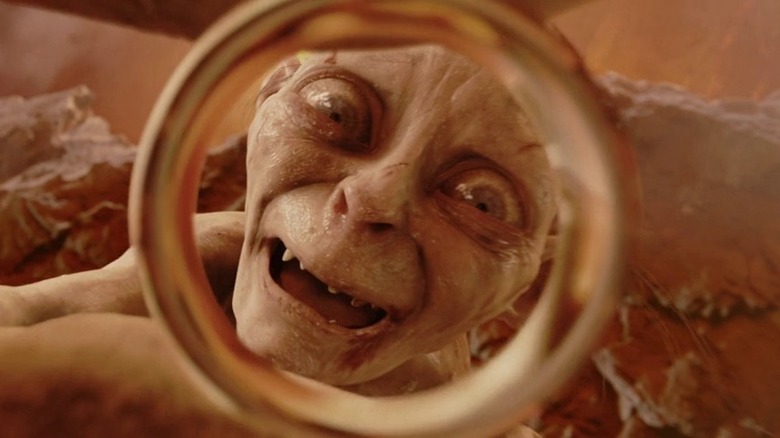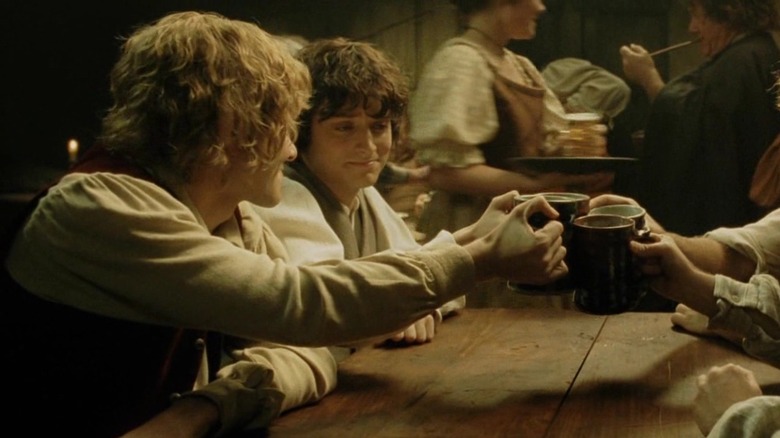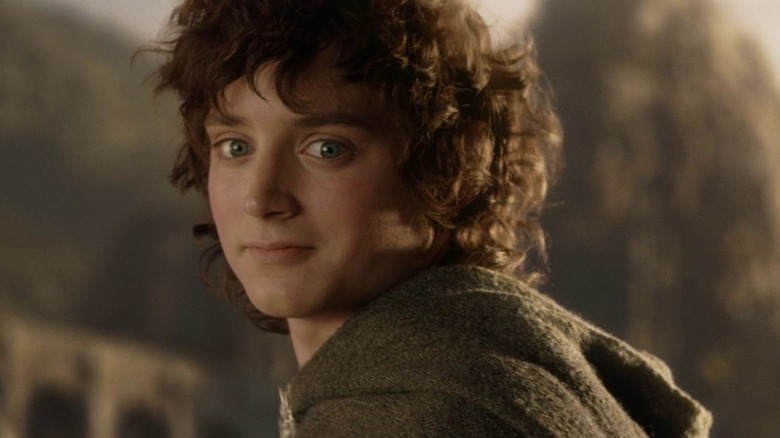20 Years Ago, Return Of The King Capped Off A Box Office Run For The Ages
(Welcome to Tales from the Box Office, our column that examines box office miracles, disasters, and everything in between, as well as what we can learn from them.)
At this point, Peter Jackson's "Lord of the Rings" trilogy is the stuff of pure legend. What the filmmaker accomplished — filming three of the most sprawling fantasy epics all at once, with all three films turning into monster success stories both critically and commercially — is made all the more impressive when we consider that before filming J.R.R. Tolkien's Middle-earth saga, Jackson was best known for making smaller-scale horror movies like "The Frighteners." 20 years ago, that success story took its most impressive victory lap when "The Lord of the Rings: The Return of the King" hit theaters.
For all of the financial success (unexpected though it may have been) that both "The Fellowship of the Ring" and "The Two Towers" had achieved, one thing had eluded these films: a big night at the Oscars. Yes, the films had garnered lots of nominations and won some technical awards, but the brass at New Line Cinema wanted to go out with a bang: they wanted to see "Return of the King" take home the Oscar for Best Picture. Indeed, that would come to pass, but it was just the cherry on top of a sky-high sundae.
In this week's Tales from the Box Office, in honor of the 20th anniversary of "Return of the King," we're looking back at the finale to Jackson's epic trilogy, why getting the film finished went right down to the wire, what happened when it hit theaters, and how the film made history at the Academy Awards. Let's get into it.
The movie: The Lord of the Rings: The Return of the King
For all the uncertainty that swirled around Jackson's adaptation of Tolkien's beloved texts, audiences unquestionably ate it up. "Fellowship of the Ring" took in $880 million worldwide, with "The Two Towers" pulling in an even more impressive $936 million. There was no longer any question regarding audience interest. The question was whether or not the trilogy would end on a high note, commercially speaking.
"The Return of the King" focuses on the final confrontation in the fight for the future of Middle-earth, with Frodo (Elijah Wood) and Sam (Sean Astin) desperately trying to reach Mordor to destroy the ring while Aragorn (Viggo Mortensen) leads what forces he can gather against Sauron's army. Though principal photography had been finished years prior, as Jackson filmed all three movies at once, reshoots were needed during the post-production process. Back in 2003, Gandalf actor Ian McKellen recalled in his online journal "The White Book" how that process went for him:
"My work revolves around a few new lines that will be cut within scenes otherwise completed over two years ago, some of which I have no recollection of having read, let alone learnt and filmed! It's little wonder that the director has had the same problem, solved by replaying shot footage on a palm-sized video recorder."
Reshoots ran through June, which meant Jackson would be editing right up to the release date. But even with a hulking runtime exceeding three hours, some sacrifices had to be made. To that end, Christopher Lee's Saruman was cut out of the theatrical version entirely. "When the third film came along and I wasn't in it, I didn't understand," Lee said to Herald on Sunday in 2006. "I still don't. However, you can have a difference of opinion in any walk of life but you can't have ongoing arguments. I like Peter very much. He's a brilliant director. I just don't know why he did what he did."
'The whole point is to get to that third chapter'
Eventually, the extended editions of "The Lord of the Rings" trilogy would amend this by including Lee's footage but, when the film hit theaters in 2003, it would be without one of the most celebrated actors in a sprawling ensemble full of celebrated actors. Sacrifices must be made when there is so much story left to cram into one final chapter. Sticking the landing was crucial, given how well the first two films went over, but getting the final chapter over the finish line proved challenging for Jackson. Thankfully, Martin Scorsese helped inspire the filmmaker to push through, albeit indirectly.
"I got to a point where, on my day off, I'd put on a DVD of 'Goodfellas' or 'Casino' and say, 'Okay, I know what I've got to try and do now,'" Jackson said during a 2013 interview. "I couldn't do it as good as Scorsese. But [his films] inspired and re-energized me, telling me what my job is: to come up with interesting ways to shoot scenes, interesting camera moves, and interesting ways to show the performance."
In the end, Jackson was quite happy with what he had managed to put together. After years of filming in New Zealand, reshoots, editing, press commitments, and defying expectations, Jackson had reached the finish line. Speaking with the BBC in 2003, the filmmaker explained why the third installment was his favorite of the trilogy.
"'The Return Of The King' is definitely the most emotional of the three films. It's my favourite one of the three. 'The Return Of The King' has a conclusion. It finishes the story and concludes the journey of the Fellowship, and it really brings home the point of the first two films. I mean, if you make a trilogy, the whole point is to get to that third chapter and the third chapter is what justifies what's come before."
The financial journey
As was the case with the first two entries, New Line released Jackson's favorite of the trilogy in theaters just ahead of the Christmas holiday on December 17, 2003. Perhaps not surprisingly, audiences turned out in droves to see how the tale of this powerful ring would conclude. Against a wave of praise from critics, "The Lord of the Rings: The Return of the King" was set up for a box office run for the ages.
The film opened to $72.6 million, easily topping the competition from "Mona Lisa Smile" and "Something's Gotta Give." It dropped just 30% the following weekend, taking in another $50.5 million, and topped the charts yet again. It would not surrender the top spot on the charts until mid-January (to "Along Came Polly" of all things). But the movie kept earning right through February in the lead-up to awards season.
"Return of the King" would eventually finish its original theatrical run with $377 million domestically and a monster $763 million internationally for a grand total of $1.14 billion. It was, at the time, only the second movie in history to cross $1 billion at the box office after James Cameron's "Titanic." It finished as the top-grossing movie of 2003 and remains the 27th biggest movie in history, not accounting for inflation.
The combined budgets for the trilogy totaled $281 million, and that had already proved to be well worth it for New Line and The Weinstein Company. It was the mic drop to end all mic drops. But the ticket sales were just the start of the party. The real victory lap would come on Oscar night.
And the Oscar goes to...
"The biggest problem –– and this started with Fellowship –– was we had the dreaded F word; we were the fantasy movie, and there was no fantasy movies that ever won for Best Picture," said Russell Schwartz, the president of theatrical marketing for New Line Cinema in 2004, later explained to Vanity Fair. Indeed, the Academy was not known for rewarding fantasy or genre films with the top prizes. Even to this day, it does so very selectively.
New Line poured immense resources into the Academy Awards campaign for "Return of the King," including hiring a small team of Oscar consultants. The studio spent about $10 million on the campaign, and to say it paid off would be an understatement. The film secured 11 nominations, including one for Best Picture, a category that also included "Lost in Translation," "Master and Commander: The Far Side of the World," and "Seabiscuit."
But would anything be different this time around? After all, both "Fellowship" and "Two Towers" were nominated for Best Picture as well, losing to "A Beautiful Mind" and "Chicago," respectively.
"[It] was basically two years of 'They're not going to get it, they're not going to get it, they have to get it on 'Return of the King,'" Christina Kounelias, executive vice president of marketing at New Line in 2004, said in the same Vanity Fair piece. "So our job, and I think we did it well, was to create this sense of inevitability around the movie.
An awards season sweep for the ages
The team did their job and did it well. "The Lord of the Rings: The Return of the King" would become one of just three movies in the history of the Academy Awards to pull off a clean sweep, winning in all 11 categories it was nominated in. The previous two movies to pull off this feat — "Gigi" and "The Last Emperor" — won in nine categories. "King" tied both "Titanic" and "Ben Hur" for the most wins ever. It was a historic night, to put it lightly. The only downside at all is that none of the actors were even nominated for their performances.
"I'm so honored and relieved that the Academy and the members of the Academy that have supported us have seen past the trolls and the wizards and the hobbits in recognizing fantasy this year," Jackson said in his acceptance speech. That was the key difference: Not only did the movie finally get the Best Picture win to cap off this incredible run, but it proved that a fantasy film could go the distance. No longer did these films need to be looked upon as less-than.
New Line, understandably, celebrated the victory. And why not? If a movie is very lucky, it can go on to become a commercial success or a critical darling. Both ever so rarely happen. To become one of the highest-grossing movies in history and one of the most decorated in the history of the Oscars? We're talking the rarest of rare air. Even 20 years later, this feels remarkable. As a means of celebration, select members of the team were given a custom ring meant to look like a Super Bowl ring with the number "11" in the middle, signifying the number of wins.
The lessons contained within
Hollywood has been utterly obsessed with franchise filmmaking in the 20 years since Jackson wrapped up his "Lord of the Rings" trilogy. To that end, the filmmaker later returned to adapt "The Hobbit" into a trilogy as well. However, the films were not nearly as well regarded as his previous Tolkien adaptations. Jackson would need to settle for generating nearly $3 billion more at the box office. But I digress.
Looking back, it still feels astounding to consider what Jackson accomplished in making this trilogy. So much could have gone wrong. The texts seemed unadaptable, and they were being adapted by a filmmaker with no real blockbuster experience to speak of. Against the odds, Jackson delivered three of the greatest, most successful movies of all time, released one after another for three years straight. The budgets were big but not astronomical, and Warner Bros. has made a damn fortune on these movies well beyond what they made in theaters. We throw around the word 'amazing' a whole lot, but this was truly amazing. "Return of the King" deserved every one of those Oscars. Peter Jackson, and the small army that made these films possible, deserved their moment in the sun.
Nothing that has come since has felt quite as special. Not "The Hobbit" films, and not Amazon's tremendously expensive "The Rings of Power" TV series. One can only hope that Warner Bros. can find a way to make the new "Lord of the Rings" movies they are currently developing feel fractionally as special as Jackson's original trilogy. But that is no easy task. That being the case, it's all the more worthwhile to marvel once more at the accomplishment that was "The Lord of the Rings" trilogy, rightfully punctuated by the unprecedented critical and commercial celebration of "The Return of the King."
